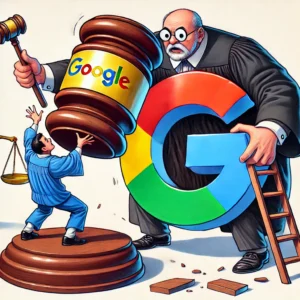DOJ Considers Breaking Up Google After Monopoly Ruling
The U.S. Department of Justice (DOJ) is deliberating on whether to break up Google, following a landmark ruling by a federal court declaring the company as a monopolist. The decision came after years of accusations that Google, with its overwhelming dominance in the search engine market, has been stifling competition through practices that give it an unfair advantage over rivals. Google holds over 89% of the search engine market, and the court emphasized its use of default agreements to maintain this grip, particularly on mobile devices.
The Role of the DOJ in Addressing Google’s Monopoly
This court ruling is significant in the ongoing efforts by the U.S. government to regulate Big Tech. The DOJ, along with state attorneys general, has been investigating Google for years, culminating in this antitrust victory. The central issue lies in Google’s strategic partnerships and control over the digital advertising space. By making its search engine the default on mobile devices and browsers, Google has created a near-impossible landscape for competitors to challenge its dominance.
Challenges and Solutions for the Tech Sector
If the DOJ proceeds with its proposed actions, it could involve splitting key parts of Google’s business, such as its Android operating system or Chrome browser. This move would undoubtedly shake up the entire technology industry. While this could benefit smaller competitors, there are concerns about potential disruptions to users and businesses that depend heavily on Google’s integrated services.
Recent Trends in Big Tech Antitrust Cases
Google’s antitrust case is part of a larger trend in the U.S. government’s efforts to curb the influence of tech giants. Other companies, like Meta and Amazon, are also facing similar scrutiny. This ruling marks a turning point, signaling the government’s willingness to take on Big Tech after decades of relative regulatory inaction.
Why the Potential Breakup Matters
This case has broader implications for the tech industry and consumer rights. Breaking up Google could create more competition, fostering innovation and reducing the concentration of power within a few major corporations. However, it also raises questions about the future of digital advertising, search engines, and how consumers interact with these technologies. Many analysts believe that splitting up Google could result in more innovation across the industry, benefiting smaller tech companies.
Consequences for Google’s Future and the Industry
The potential breakup of Google may lead to more fragmented but competitive digital ecosystems. While Google may remain a dominant player, it could be forced to divest certain business units, which would allow smaller companies to gain a foothold in areas like search, mobile operating systems, and online advertising. This could transform how consumers access information and digital services, leading to more choice and diversity in the marketplace.

Conclusion and Future Developments
In conclusion, the DOJ’s pursuit of breaking up Google highlights the increasing scrutiny on Big Tech. The final decision, expected in the coming months, will likely set a precedent for future antitrust cases involving other major tech firms. As the industry braces for possible regulatory changes, the implications of this case will continue to unfold, with the potential to reshape the digital landscape in the years to come.


